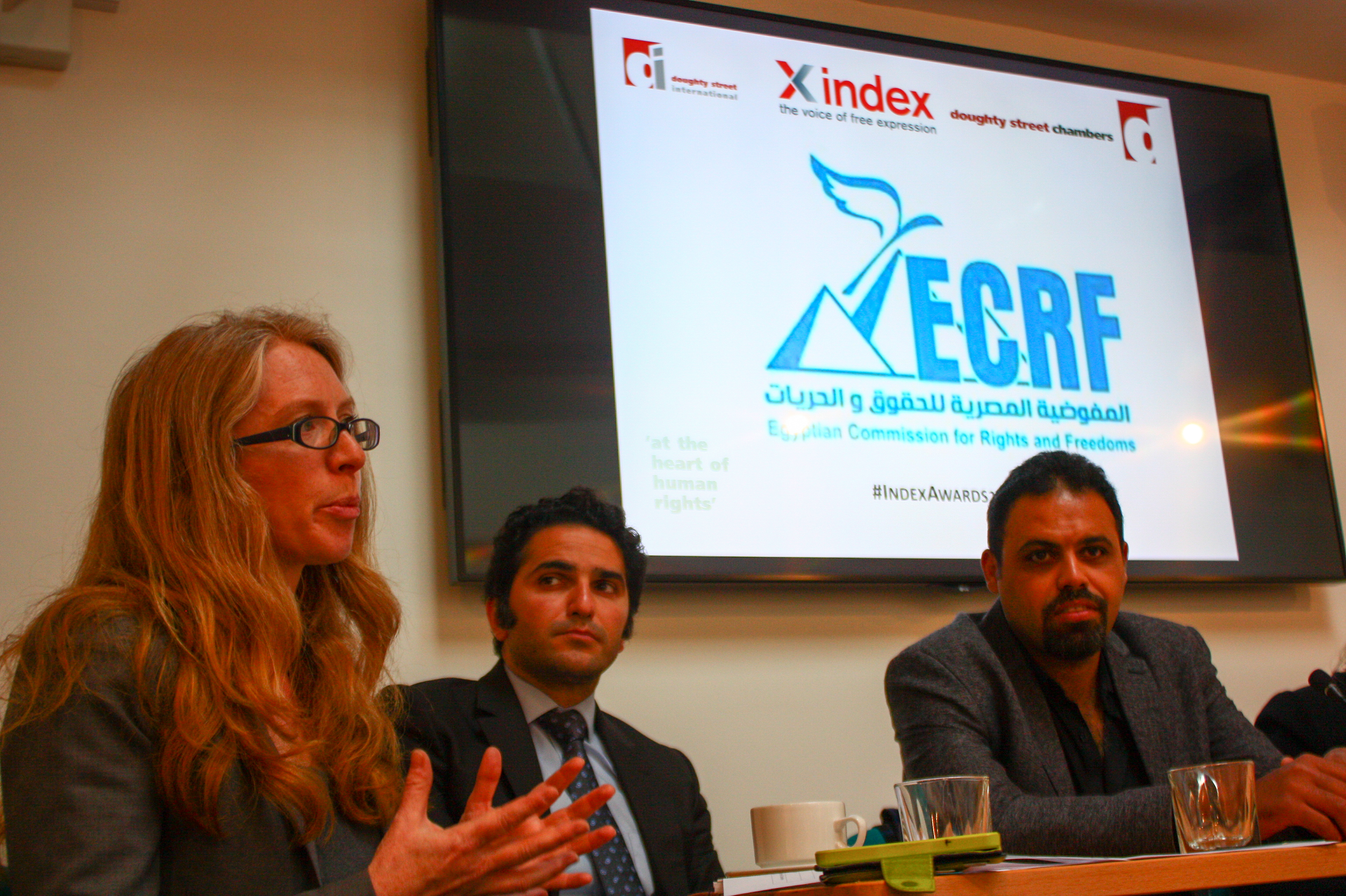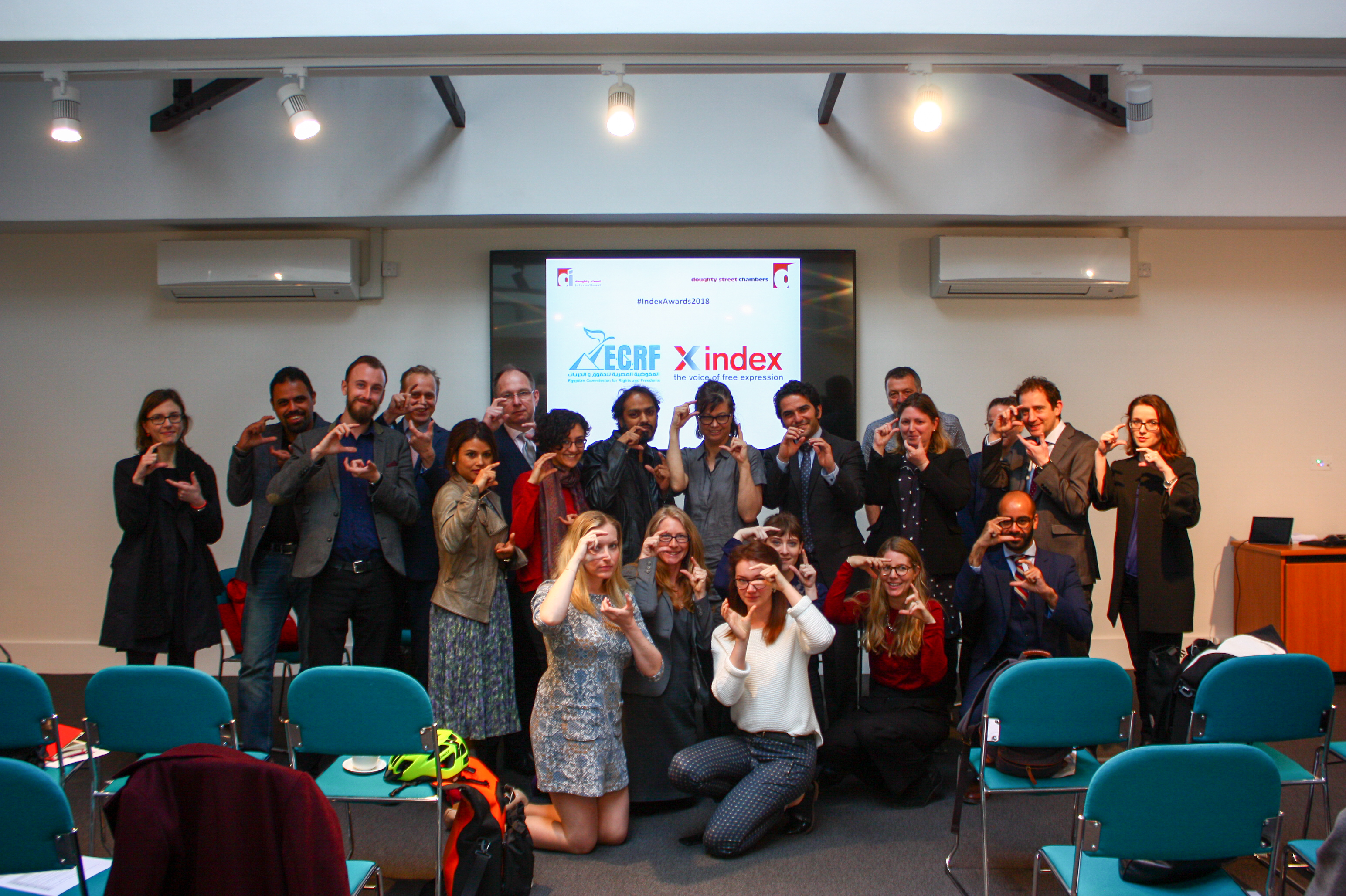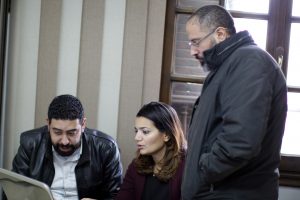Index relies entirely on the support of donors and readers to do its work.
Help us keep amplifying censored voices today.
[vc_row][vc_column][vc_column_text]Freedom of expression organisation Index on Censorship calls on Egypt to immediately release activist Amal Fathy, who was detained by police last Friday.
Fathy was arrested alongside her husband Mohamed Lotfy, director of the award-winning human rights organisation, the Egyptian Commission for Rights and Freedoms. Police raided the couple’s home in Cairo at 2.30 a.m. and took them and their 3-year-old child to the police station. Security officers searched their house, their mobile phones were seized and they were denied the right to communicate with a lawyer or family.
Lotfy and their child were released after three hours but Fathy has been ordered to remain in detention for 15 days on “on charges of incitement to overthrow the ruling system, publishing lies and misusing social media”.
On Wednesday, Fathy posted a video on her Facebook page in which she spoke about the prevalence of sexual harassment in Egypt, criticizing the government’s failure to protect women. She also criticised the government for deteriorating human rights, socioeconomic conditions and public services.
Rachael Jolley, editor of Index on Censorship, said: “This is just the latest attempt by the Egyptian government to stop the public being informed about what is going in their country. The authorities must release Amal Fathy immediately.”
Fathy’s husband is co-founder of the Egyptian Commission for Rights and Freedoms (ECRF). ECRF, a 2018 winner of an Index on Censorship Freedom of Expression award, works on documenting cases concerning torture in prisons and enforced disappearance in an increasingly difficult climate in Egypt where independent voices are suppressed and threatened.
For more information, please contact Jodie Ginsberg at [email protected][/vc_column_text][/vc_column][/vc_row][vc_row][vc_column][vc_basic_grid post_type=”post” max_items=”12″ style=”load-more” items_per_page=”4″ element_width=”6″ grid_id=”vc_gid:1526299869862-1ce8ff4a-0268-2″ taxonomies=”147, 24135″][/vc_column][/vc_row]
[vc_row][vc_column][vc_column_text]Egyptian security forces have targeted one of the last human rights organisations in the country, the Egyptian Commission for Rights and Freedoms, by detaining executive director Mohamed Lotfy with his wife, Amal Fathy, and their two-year-old-son.
Security officers searched their house, their mobile phones were seized and they were denied the right to communicate with a lawyer or family.
ECRF, a 2018 winner of an Index on Censorship Freedom of Expression award, works on documenting cases concerning torture in prisons and enforced disappearance in an increasingly difficult climate in Egypt where independent voices are suppressed and threatened.
Rachael Jolley, editor of Index on Censorship, said: “It is shocking how the lives of people who are working to make public information about torture in Egyptian prisons and other human rights violations are being threatened. Obviously the intention of this action, and others, is to stop the incredibly brave members of staff at this organisation carrying on with their important work. Index calls on governments around the world to put pressure on Egypt to release Amal Fathy and to shine a spotlight on the Egyptian government’s frightening tactics to stop the public knowing what is going on in that country.”
Authoritarian governments are increasing using arrest, detention or threats to family members to stop human rights activists carrying on with their work.
Lotfy and his son have been released, however his wife Amal Fathy remains in detention. Fathy has been ordered detained for a 15 days by the prosecution.
#الحرية_لأمل_فتحي
#Free_Amal_Fathy
#ECRF[/vc_column_text][/vc_column][/vc_row][vc_row][vc_column][vc_basic_grid post_type=”post” max_items=”12″ style=”load-more” items_per_page=”4″ element_width=”6″ grid_id=”vc_gid:1545211672482-eba4610a-2b33-8″ taxonomies=”24136, 24135″][/vc_column][/vc_row]
[vc_row][vc_column][vc_column_text]

Index on Censorship’s CEO Jodie Ginsberg discusses change in Egypt with activists Mohamed Sameh and Ahmad Abdullah (Photo credit: Alessio Perrone)
The opening line of Rousseau’s treatise The Social Contract reads: “Man is born free, and he is everywhere in chains. Those who think themselves masters of others are indeed greater slaves than they.”
This was one of several books to feature in a book club started by Ahmad Abdallah during his four and a half months spent in prison. The co-founder of the Index on Censorship Freedom of Expression Award nominee Egyptian Commission for Rights and Freedoms (ECRF) was arrested without a warrant on 25 April 2016 for alleged terrorist activity.
Awoken by masked members of the special forces prodding him with a machine gun he first thought it was a prank, he recalled at an event discussing human rights in Egypt on 17 April 2018 at Doughty Street Chambers.
The worst of the worst
“I thought it was someone joking, maybe my mum, maybe my father,” he said. “But I got up and then I was afraid for my family. I was pushed by the machine gun once again and my parents were at the side of the door. Then I ask the chief of this group: ‘do you have a warrant for me?’ They showed me nothing, they searched my house and then I was detained.” They said, “what will you do if we don’t have one?”
Index on Censorship CEO Jodie Ginsberg condemned the Egyptian authorities for the misuse of terror legislation to persecute peaceful critics like Abdallah and his colleague Mohamed Sameh.
Speaking to the room, Abdallah told of his continued attempts to challenge repressive ideas and the Egyptian government even while in prison.
He was shocked to be branded a terrorist. “I had nothing to do with these groups. I was jailed with some of our brotherhood and even some of ISIS. I was very afraid at this time. They are the worst of the worst,” he said.
His answer to this fear was books. “I started a book club because I was afraid of the ISIS guys,” he said.
“I was really afraid so I said: ‘OK, why don’t we start a reading club. We have plenty of time, we are in jail! You can bring your books and I can bring my books, maybe we can be more enlightened. I got them books: Rousseau’s Social Contract, literature books, Kafka, philosophy books, Orwell’s 1984 and Animal Farm and as one month elapsed, the ISIS guy was isolated. Everyone was against his ideas and my ideas were spreading amongst other prisoners,” the human rights defender continued.

Attendees of the seminar in group solidarity for Egypt and Shawkan, the persecuted photojournalist #mypicforshawkan (photo credit: Alessio Perrone)
As a result, Abdallah was put in solitary confinement where he was in complete darkness and without food for two days.
“Egyptians are not low rank humans. We need our fundamental rights like everyone else”
Human rights activists and journalists are systematically targeted in Egypt and, like Ahmad Abdallah, called terrorists. Jeremy Dear, representing the International Federation of Journalists at the event, informed attendees 21 journalists have been killed in the country since 2011. More than 20 have been imprisoned, half of which without charge.
Forced disappearances and media harassment
The precise numbers of those targeted are unknown, even to the ECRF. The organisation was set up in 2013 after someone came to Abdallah and Mohamed Lotfy (executive director and co-founder of ECRF) saying his friend had gone missing. This led them to question whether the disappearance was “a single event or a pattern.”
The organisation, nominated for an Index on Censorship Freedom of Expression Award, has since worked on cases involving forced disappearance and the prevention of censorship. The government has made it increasingly difficult for them to conduct their work and their offices were raided twice last year. Their website was also blocked.
The group continues to work towards improved human rights despite the dangers. Ahmad said it is their passion and desire for change that keeps them going. “Egyptians are not low rank humans. We need our fundamental rights like everyone else,” he added.
Sameh continued: “Why do we continue? Much sacrifice has already been done. We really do love Egyptians, we really love humans, we really love our families and we think there is a better way of living, of respecting each other. The reason we keep going is because we think we can change that. I think there is serious hope that we can achieve something. We are showing these people are not left behind, that they are not forgotten.”
Peter Greste, an Al Jhazeera journalist who was imprisoned in Egypt, sent a video message of support Abdallah and Sameh. He told of how in 2014 they had been convicted under terrorist charges. Greste said: “The charges were related to the work we had been doing for Al Jhazeera English… At the time, I struggled to make sense of what they were going through, the gap which was between what they were accused of doing, joining a terrorist group, and what they were actually doing… I couldn’t understand how anyone could draw the conclusions that the prosecution… came to.”
The seminar, “Freedom of Expression and the Protection of Human Rights in Egypt,” concluded hopefully. Ginsberg from Index on Censorship posited several ways those in the room could help. This included a suggestion that media organisations each take a case and closely follow it.
She said: “I know sometimes we think we are sitting here talking and nobody’s paying attention, but actually these kind of public solidarity actions do matter. They matter to the individuals who are in detention and they also matter and bother the authorities.”
Jeremy Dear agreed, emphasising the importance of support from societies with media freedom. He said: “There’s no doubt that in the past few years the space for dissenting and independent voices has shrunk in Egypt. We have a duty to ensure that we are doing everything that we can to create the space for them and help them create their own space to raise their own voices.”[/vc_column_text][/vc_column][/vc_row][vc_row][vc_column][vc_basic_grid post_type=”post” max_items=”4″ style=”load-more” items_per_page=”4″ element_width=”6″ btn_shape=”square” btn_align=”center” grid_id=”vc_gid:1524045621403-609ab883-1e90-3″][/vc_column][/vc_row]
[vc_row][vc_column][vc_video link=”https://youtu.be/7kseuuaARZQ”][vc_column_text]The Egyptian Commission for Rights and Freedoms (ECRF) is one of the only human rights organisations still operating in a country increasingly hostile to dissent and in which countless civil society organisations have been forced to close. The commission coordinates campaigns for those who have been tortured or disappeared, as well as highlighting numerous incidences of human rights abuses.
“Our main goal to achieve in the future, which is stated in our mission, is to empower individuals to acquire their rights, promote a culture of democracy in the Egyptian society, and expand human rights to every home in Egypt,” ECRF told Index. “But in the end of the day we decide to carry out with our work regardless of the challenges because if everyone is silenced this would be the ultimate gain to the current regime, and the ultimate victory to Egypt’s state of fear.”
Between August 2016 and August 2017, the ECRF documented 378 cases of enforced disappearance many of whom were students. The cases of the disappeared are not reported in the heavily censored local media, and the commission’s website and social media sites are some of the few places their plight can be publicised, reported and mapped.
The highly restrictive and repressive environment Egypt has made it increasingly difficult for the organisation to do its work.
Their website was blocked in September in government measures designed to close the organisation down, but the ECRF managed to create a parallel website to maintain their presence and engagement with the public. Twice last year ECRF’s headquarters was raided by security forces with two staff members being arrested. As a result, the staff need help dealing with the risks of being arrested, as well as dealing with the interrogation process and knowing how to protect information.
Over the past 12 months the ECRF has been fighting censorship and defending human rights in two ways. The first is through the criminal justice programme which tackles issues of torture and enforced disappearances in Egypt. It has been particularly focused on the arrest of activists who took part in demonstrations against Egypt’s agreement to cede two uninhabited islands in the Red Sea to Saudi Arabia.

Secondly, ECRF has worked on challenging censorship imposed on student associations in universities. Recently the commission launched an online platform to bring students and practitioners online to discuss a student charter related to freedom of association in universities. The platform was heavily criticised by the ministry of higher education in Cairo, which led to further condemnation of it in official media outlets.
As a direct result of the work ECRF has carried out over the past year, there has been an increased awareness of enforced disappearances, media censorship, the scale of torture, and violations of freedom of association and expression in media and universities.
“ECRF is honored to be shortlisted alongside three peer organizations/campaigns also facing severe human rights challenges in their own countries,” said ECRF. “The international recognition of ECRF’s efforts in campaigning for fundamental freedoms emboldens its members and staff in their resilience to strive for human rights and democracy in Egypt. Regardless of the winner, progress towards equal rights in Russia means progress in Egypt and progress in Kenya means progress in Iran and vice-versa.”
See the full shortlist for Index on Censorship’s Freedom of Expression Awards 2018 here.[/vc_column_text][/vc_column][/vc_row][vc_row full_width=”stretch_row_content” equal_height=”yes” el_class=”text_white” css=”.vc_custom_1490258749071{background-color: #cb3000 !important;}”][vc_column width=”1/2″][vc_custom_heading text=”Support the Index Fellowship.” font_container=”tag:p|font_size:28|text_align:center” use_theme_fonts=”yes” link=”url:https%3A%2F%2Fwww.indexoncensorship.org%2Fsupport-the-freedom-of-expression-awards%2F|||”][vc_column_text]
By donating to the Freedom of Expression Awards you help us support
individuals and groups at the forefront of tackling censorship.
[/vc_column_text][/vc_column][vc_column width=”1/2″ css=”.vc_custom_1521479845471{background-image: url(https://www.indexoncensorship.org/wp-content/uploads/2017/05/2017-awards-fellows-1460×490-2_revised.jpg?id=90090) !important;background-position: center !important;background-repeat: no-repeat !important;background-size: cover !important;}”][/vc_column][/vc_row][vc_row][vc_column][vc_basic_grid post_type=”post” max_items=”4″ element_width=”6″ grid_id=”vc_gid:1522065946315-a2955265-bb40-3″ taxonomies=”10735″][/vc_column][/vc_row]